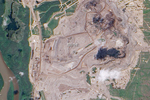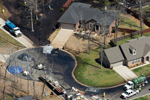Hundreds of activists including Bill McKibben and Naomi Klein are going into the heart of Canada’s tar sands this week – not to protest the destruction of the local environment, but to pray for the ‘healing’ of land and the people.
Native elders from all over North America will lead people past lakes of tailings wastewater and massive infrastructure of the tar sands industry along the Athabasca River in Fort McMurray, Alberta.
Organizers say the event, dubbed the Healing Walk, will be a spiritual gathering focused on healing the land, air, water and all living things harmed by the expansion of what is already the world’s largest industrial project.
“This is a sacred walk because it invites us all to begin a process of healing—healing the land from violence, healing ourselves from our dependence on an economy based on that violence, and healing our deeply imperiled democracy,” said Naomi Klein, writer and author of bestselling “The Shock Doctrine” on why she is participating.
There are plans to triple the size of the tar sands over the next two decades. An international science panel recently warned that the nearly 200sqkm of toxic wastewater is the biggest threat to the Athabasca and Mackenzie Rivers, a region they called “Canada’s Serengeti.”
“The land is sick here. The people are sick from polluted air, water and food,” says Jesse Cardinal, co-organizer from the Keepers of the Athabasca, an alliance of native and non-natives who started the Healing Walks.
“There is emotional and spiritual sickness too,” Cardinal said referring to high rates of drug use and prostitution among the tens of thousands of tar sands workers including native people.
The tar sands boom is also “poisoning” Canada’s politics through “escalating attacks on First Nations rights, by the dismantling of crucial environmental protections, and by the gagging of scientists,” Klein said.
Cardinal believes that “prayer is powerful. We have faith a higher power will reach out to those causing all this destruction.”
The 8-mile (14-km) walk on 6 July will be the fourth and it will have special meaning. Four is a sacred number among many native peoples and in other cultures, said Clayton Thomas-Muller.
“It means this is the beginning of a new cycle, a slowdown and eventual end to the tar sands,” Thomas-Muller, a co-ordinator with the Idle No More movement, an ongoing protest much like Occupy Wall Street that spread across Canada in protest against the Harper government removing indigenous rights and environmental protections.
More than 100,000 are active and planning a summer long series of actions in Canada and other countries, he said.There will be no protests or protest signs allowed on the Healing Walk.
“I’ll be taking off my activist hat,” said Hannah McKinnon of Environmental Defense Canada.

Aerial view of Syncrude’s base mine with tailing pond in the background. Photo in Public Domain.
Original Post: Bill McKibben and Naomi Klein to join Canada’s tar sands ‘healing walk’
Related articles
Canadian province cancels tar sands pipeline due to environmental impact
(06/04/2013) Efforts to expand production from the Alberta tar sands suffered a significant setback on Friday when the provincial government of British Columbia rejected a pipeline project because of environmental shortcomings. In a strongly worded statement, the government of the province said it was not satisfied with the pipeline company’s oil spill response plans.
Canadian government drops over $16 million on advertising its tar sands

(05/16/2013) The Canadian government has nearly doubled its advertising spending to promote the Alberta tar sands in an aggressive new lobbying push ahead of Thursday’s visit to New York by the prime minister, Stephen Harper. The Harper government has increased its advertising spending on the Alberta tar sands to $16.5m from $9m a year ago.
Citizen group finds 30 toxic chemicals in air following tar sands oil spill in Arkansas

(04/30/2013) Independent air samples by locals have yielded “a soup of toxic chemicals” in Mayflower, Arkansas where an Exxon Mobil pipeline burst on March 29th spilling some 5,000 barrels of tar sands oil, known as bitumen. Chemicals detected included several linked to cancer, reproductive problems, and neurological impacts such as benzene and ethylbenzene. Air samples were taken by community leader and University of Central Arkansas student April Lane a day after the spill. However, the Environment Protection Agency (EPA)’s and Exxon Mobil’s air samples have yielded chemical levels below harm except in the direct clean-up area, according to the Arkansas Department of Health (ADH).
Tar sands oil spill: ruptured pipe pours 200,000 gallons of oil into suburban neighborhood (photos)

(04/04/2013) Last Saturday, an oil pipeline carrying tar sands oil from Canada ruptured in Mayflower, Arkansas spilling between 3,500-5,000 barrels of crude (at most 210,000 gallons) into neighborhood streets and lawns. Families from 22 homes have been evacuated while clean-up crews have scrambled to contain the spill. ExxonMobil, which runs the 65-year-old Pegasus pipeline, has stated it will pay for any damage, however critics say the oil spill is more evidence that the Obama Administration should turn down the Keystone XL tar sands pipeline.
Over 35,000 march on Washington demanding climate action and rejection of Canada’s ‘carbon bomb’

(02/18/2013) Yesterday over 35,000 people rallied in Washington D.C. for urgent action on climate change, which, according to organizers, was the largest climate march in U.S. history. Activists called on the Obama Administration to do much more to tackle climate change, including rejecting the Keystone XL Pipeline, which would bring carbon-heavy tar sands oil from Canada through the U.S. to a world market.
Climate activists march on White House again to oppose Keystone XL pipeline
(11/19/2012) Yesterday, climate activists marched around the White House in opposition against the Keystone XL pipeline, which if built will carry tar sands from Canada to the Gulf of Mexico and an international market. The protest, which included over 3,000 people according to organizing groups, is an opening salvo in activists’ battle to convince the Obama Administration to turn down the pipeline for good.